
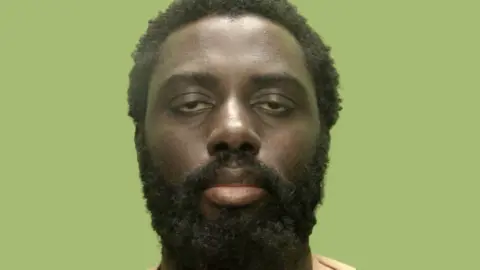 Nottinghamshire Police
Nottinghamshire PoliceA doctor warned three years before the Nottingham attacks that Valdo Calocane’s mental illness was so severe he could “end up killing someone”, the BBC can reveal.
This was one of a series of missed opportunities over three years that could have prevented the killings, Calocane’s mother and brother told BBC Panorama in their first interview.
The doctor’s warning appeared in a 300-page summary of medical records the family received only after Calocane was sentenced for the killings, which they have shared with Panorama.
The chief executive of Nottinghamshire’s NHS trust said he would do everything he could to stop such a tragedy happening again.
Calocane was diagnosed with paranoid schizophrenia in 2020 and was sectioned four times in less than two years.
In June 2023, he went on a rampage through the streets of Nottingham, killing students Barnaby Webber and Grace O’Malley-Kumar, both aged 19, with a knife as they returned from a night out, before stabbing to death Ian Coates, 65, near the school where he worked as a caretaker.
Calocane then stole his van and crashed into three other people, inflicting serious injuries.
The warning was given by one psychiatrist while the medical team reviewed Calocane on the ward and was set down in medical records held by Nottinghamshire NHS trust.
Elias and Celeste, Calocane’s brother and mother, said the mental health system was “broken” and led to a “tragedy that could have been prevented”.
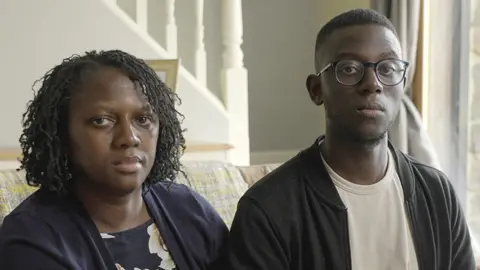
The BBC has also learned:
- In autumn 2020, Calocane admitted lying to doctors earlier that year about no longer hearing voices so that he could be discharged from hospital, but was not admitted again until nearly a year later
- In 2022, the community mental health team discharged Calocane to his GP because he was not responding to them – on the same day an arrest warrant for him was issued over the assault of a police officer
- Calocane’s longest stay in hospital during his four admissions was seven weeks, despite being twice eligible for stays of up to six months
- His family say they only discovered he had been diagnosed with paranoid schizophrenia months after the attacks in 2023, and more than three years after he had first been diagnosed
- The Calocane family wants a public inquiry, but is also calling for urgent reform of mental health services
First section: ‘I hear voices’
Elias Calocane told the BBC he first became aware that something was wrong with his brother, who was studying mechanical engineering at the University of Nottingham, during one of their regular phone calls in May 2020.
The family said Valdo Calocane had previously shown no signs of mental illness as a teenager or young man.
“He was just crying on the other side of the phone for 40 minutes,” Elias said. “Finally, he said to me, ‘I hear voices’.”
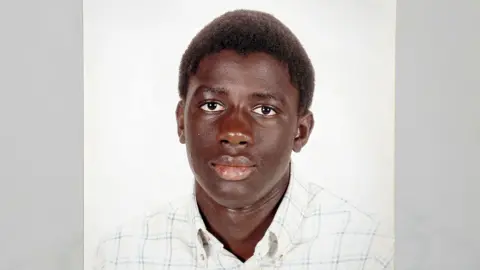 FAMILY HANDOUT
FAMILY HANDOUTCalocane’s first admission for mental health treatment came on 25 May after two incidents when he broke into neighbours’ flats, believing his mother was being raped inside.
He was prescribed medication by doctors for a psychotic episode and released from custody by police. His mother, Celeste, asked the mental health team to keep him until she arrived from Wales, but her pleas were ignored.
His family said this was the first of the missed opportunities to prevent someone being hurt, because he was not admitted to hospital until after he had carried out another break-in.
An hour after his release, Calocane tried to get into another flat. The woman inside was so terrified she jumped from a first-floor window to escape and was severely injured.
He was arrested again and this time taken to Highbury Hospital in Nottingham under section 2 of the Mental Health Act, which meant he could be kept in hospital against his will for up to 28 days – known as a “section”.
Second section: ‘No insight or remorse’
Four weeks later, Calocane was still hearing voices and believed they were coming from another neighbour’s flat. Again, he tried to break in.
He was sectioned again, this time under section 3 of the Mental Health Act, which allows for a longer hospital stay of up to six months.
According to the medical records, at a July 2020 meeting with health and care professionals while Calocane was ill in hospital, a psychiatrist observed that “there seems to be no insight or remorse and the danger is that this will happen again and perhaps Valdo will end up killing someone”.
Forensic psychiatrist Dr Richard Taylor – who has not treated Valdo Calocane but has treated people with serious mental illness and been an expert witness in more than 150 court cases – said that in his 30 years in the field, he cannot recall ever seeing such a remark written down in medical records before.
![A graphic showing a pull-quote from Valdo Calocane's medical notes saying: "Dr [NAME REDACTED] observed that there seems to be no insight or remorse and that the danger is that this will happen again and perhaps Valdo will end up killing someone."](https://ichef.bbci.co.uk/news/480/cpsprodpb/5ec0/live/bf5321c0-5655-11ef-aebc-6de4d31bf5cd.png.webp)
“If a psychiatrist is committing themselves to a serious risk of homicide, then I think that’s something I would expect to be taken very seriously,” he said.
But two weeks after this entry was made, Calocane was discharged from Highbury Hospital.
Upon discharge, a formal diagnosis of paranoid schizophrenia was sent to his GP.
His family, who were in regular contact with mental health services, say they were not informed of this diagnosis and instead believed he was still suffering from isolated episodes of psychosis rather than a long-term mental health condition.
Third section: ‘Prove his power’
The medical records show that in the autumn of 2020, Calocane admitted to his community mental health team that he had lied to doctors at Highbury Hospital earlier in the year about no longer hearing voices because he was “tired” of being there.
He told them he could still hear the voices, that they “talk to each other about him”, and suggest he should “prove his power.”
But he still insisted he wasn’t mentally ill, believing the voices he heard were real people who were intelligence agents and police officers.
He was prescribed a higher dose of his medication. Although he had told the team that his mental health was improving by spring 2021, his mother contacted them to say she was worried that he was becoming “unwell” again.
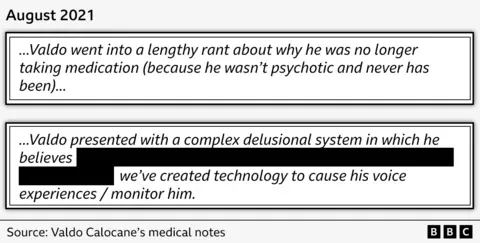
In September 2021, Calocane was sectioned for a third time. Police arrived at his flat in Nottingham and he punched an officer three times.
After five days in seclusion and three weeks in psychiatric intensive care, Calocane was transferred under section 3 of the Mental Health Act to an NHS-funded bed in the privately run Priory Arnold Hospital just outside Nottingham.
Less than three weeks after he arrived, a psychiatrist at the Priory reviewed Calocane and decided he was well enough to be discharged into the care of his community mental health team.
The Priory Group said discharge decisions are made in “accordance with statutory criteria” and that Calocane’s treatment and discharge into the care of his community team were “appropriate”.
Fourth section: ‘They wash their hands’
By January 2022, when he was sectioned for a fourth time after he assaulted his housemate in their student flat, Calocane had told his mental health team he did not want his family to know about his treatment and they were not told he had been admitted to hospital.
While in hospital, his community mental health nurse told doctors he had repeatedly missed appointments and not taken his tablets.
She said she thought he should be given long lasting injectable medication which would be beneficial in the long term, but that did not happen.
By that summer, the medical records show he was again missing appointments and in September 2022, the mental health team discharged him back to his GP. He had no more contact with them.
“Basically, they wash their hands and say, ‘OK, that’s it’,” said Celeste.
Dr Taylor told Panorama more should be done to make contact with patients who are not engaging.
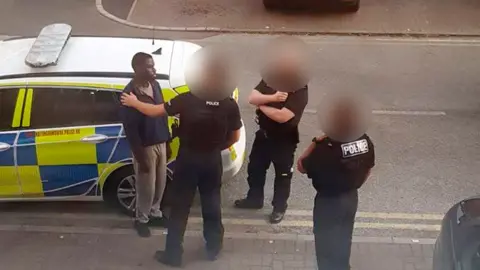 Handout
Handout“A letter on the doormat is really not effective,” he said. “I think where there’s been aggression, where there’s been revolving door, repeated admissions, then to walk away from somebody or leave it to the GP because they’re not engaging – that’s something I find problematic. And I see it quite a lot.”
The same day the decision to discharge him was made, a judge issued a warrant for Calocane’s arrest after he failed to appear in court over the earlier assault on a police officer. But police did not carry out the warrant.
The Independent Office for Police Conduct (IOPC) is investigating complaints made against Nottinghamshire Police by the families of Calocane’s victims. It said it cannot comment while the investigation continues.
Over the next nine months, Elias and Celeste said Calocane continued to distance himself from his family.
They said he told them falsely that he was living and working in Coventry, which is where they believed he was on the day of the killings.
The attacks: ‘It’s already done’
The night before the attacks Calocane called his brother. Elias said the call was “a copy” of previous conversations where he talked about his “delusions.”
At around 5am on the morning of the attacks, Calocane called Elias again. He picked up on the discussion they’d had the previous evening and told his brother to take the family out of the country, believing they were not safe in the UK because of his delusional beliefs that he was being controlled by the government.
“I asked him eventually, ‘Are you going to do something stupid?’ And he says, ‘It’s already done’. And then he hangs up.”
Elias told Panorama he was convinced that meant his brother was going to hurt himself, “that this would end in suicide”.
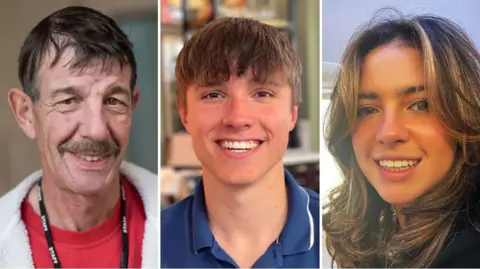 Family handout
Family handoutBut at the time of the call Calocane had already stabbed and killed the two university students, Barnaby Webber and Grace O’Malley-Kumar.
After the phone call to Elias, Calocane then went on to kill Ian Coates. He stole his van and drove into three other people, causing them serious injuries.
Five psychiatrists reviewed Calocane and the medical evidence in the case. They all agreed his violent behaviour was caused by mental illness.
Calocane was originally charged with murder. The Crown Prosecution Service changed the charge to manslaughter on the grounds of diminished responsibility and he pleaded guilty. He was sentenced to an indefinite hospital order in January and told he would “very probably” be detained for the rest of his life.
That outcome caused deep anger and pain to the families of Barnaby Webber, Grace O’Malley-Kumar and Ian Coates.


They believe Valdo Calocane, although mentally ill, knew what he was doing and should have been convicted of murder and sent to prison.
They were also angry about his sentencing and called for it to be referred to the Court of Appeal.
It found his sentence was correct and had not been unduly lenient.
Afterwards, Barnaby Webber’s mother, Emma, said in a statement: “We do not and never will agree that the vicious, calculated and planned attacks carried out were that of an individual who was at zero level of capability.
“We have never disputed that he is mentally unwell; however, he knew what he was doing, he knew that it was wrong; but he did it anyway. There should be an element of punishment for such a heinous act; alongside appropriate treatment.”
Brian Dow, deputy chief executive of the mental health charity Rethink Mental Illness, believes the state of mental healthcare in the UK has made tragic outcomes inevitable.
“Looking back, it was a question of when, not if. And unless we both invest and change the model of healthcare that we have, so we don’t allow these crises to build up and build up, then there’s the inevitable risk that this will happen again,” he said.
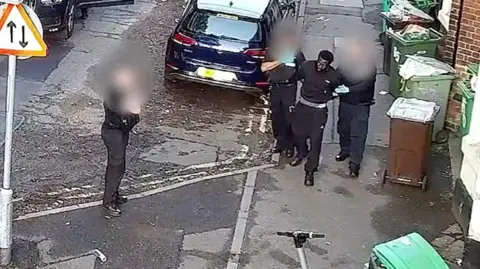 Nottinghamshire Police
Nottinghamshire PoliceThe victims’ families believe there should be a public inquiry. The Calocane family want one too and are calling for urgent reform to mental health services.
Elias said: “Yes, commission a public inquiry. Yes, we need some strong recommendations. But we can’t just say, we’ll just wait until it finishes how many years down the line and then do something about it then. Something needs to happen now.”
“There’s a lot of Valdos out there at the moment and if we haven’t got capacity to care for them I don’t know what’s going to happen. The system is not fit for purpose,” said Celeste.
A Care Quality Commission review of the care of Valdo Calocane by Nottinghamshire Healthcare NHS Foundation Trust (NHFT) is due to be published on Tuesday.
NHFT chief executive Ifti Majid said: “I have committed to do everything within my power to prevent such a tragedy reoccurring.
“We are working with our colleagues across Nottinghamshire Healthcare to continue to improve the safety and quality of our services for patients.”
Elias said he knew that nothing he could say to the victims’ families “will ever be enough”.
“I can only say that I’m sorry, that we are sorry their lives have been so utterly destroyed.”



Be the first to comment